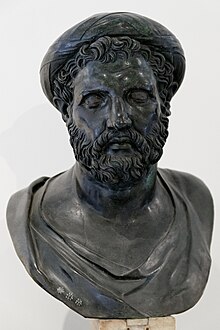Pythagoras of Samos (US: /pɪˈθæɡərəs/;[2]UK: /paɪˈθæɡərəs/;[3] Greek: Πυθαγόρας ὁ Σάμιος Pythagóras ho Sámios "Pythagoras the Samian", or simply Πυθαγόρας; Πυθαγόρης in Ionian Greek; c. 570–495 BC)[Notes 1][4] was an Ionian Greek philosopher and the eponymous founder of the Pythagoreanism movement. His political and religious teachings were extremely influential in Magna Graeciathroughout antiquity and exerted a profound impact on the philosophies of Plato, Aristotle, and, through them, Western philosophy.
Pythagoras's life is largely clouded by legend and obfuscation, but he appears to have been the son of Mnesarchus, a seal engraver on the island of Samos. Modern scholars disagree regarding Pythagoras's education and influences, but they do agree that, in around 530 BC, he travelled to Croton, where he founded a school in which initiates were sworn to secrecy and lived a communal, ascetic lifestyle. Following Croton's decisive victory over Sybaris in around 510 BC, Pythagoras's followers came into conflict with supporters of democracy and Pythagorean meeting houses were burned. Pythagoras may have been killed during this persecution, or he may have escaped to Metapontum, where he eventually died. The teaching most securely identified with Pythagoras is metempsychosis, or the "transmigration of souls", which holds that every soul is immortal and that, upon death, enters into a new body. He may have also devised the doctrine of musica universalis, which holds that the planets move according to mathematical equations and thus resonate to produce an inaudible symphony of music. He probably prohibited his followers from eating beans, but he may or may not have advocated a strict vegetarian diet.
In antiquity, Pythagoras was credited with many mathematical and scientific discoveries, including the Pythagorean theorem, Pythagorean tuning, the five regular solids, the Theory of Proportions, the sphericity of the Earth, and the identity of the morning and evening stars as the planet Venus. It was said that he was the first man to call himself a philosopher ("lover of wisdom")[Notes 2] and that he was the first to divide the globe into five climactic zones. Nonetheless, many of the accomplishments credited to Pythagoras probably either originated earlier or were made by his colleagues or successors. Some accounts mention that the philosophy associated with Pythagoras was related to mathematics and that numbers were important, but it is debated to what extent, if at all, he actually contributed to mathematics or natural philosophy.
Biographical sources
No authentic writings of Pythagoras have survived to the present day[5][6][7] and almost nothing is known for certain about his life.[8]The earliest sources on Pythagoras's life are brief, ambiguous, and often satirical.[9][7][10]The earliest source on Pythagoras's teachings is a satirical poem written by Xenophanes of Colophon, a contemporary of Pythagoras,[11][12] which describes Pythagoras interceding on behalf of a dog that is being beaten, professing to recognize in its cries the voice of a departed friend.[13][11][10]
Alcmaeon of Croton, a doctor who lived in Croton at around the same time Pythagoras lived there,[11] incorporates many Pythagorean teachings into his writings[14] and alludes to having possibly known Pythagoras personally.[14] The poet Heraclitus of Ephesus, who was born across a few miles of sea away from Samos and may have lived within Pythagoras's lifetime,[15] pegged Pythagoras as a clever charlatan,[9][15] remarking that "Pythagoras the son of Mnesarchus pursued inquiry further than all other men and, choosing what he liked from these compositions, made a wisdom of his own - much learning, artful knavery."[9][15]
The Greek poets Ion of Chios (c. 480-c. 421 BC) and Empedocles of Acragas (c. 493-c. 432 BC) both express admiration for Pythagoras in their poems.[16] The first concise early description of Pythagoras comes from the historian Herodotus of Halicarnassus (c. 484-c. 420 BC),[17] who describes Pythagoras as "one of the greatest" Greek sages[17] and states that Pythagoras taught his followers how to attain immortality.[17] The Athenian rhetoricianIsocrates (436-338 BC) was the first to describe Pythagoras as having visited Egypt.[18] Aristotle wrote a treatise On the Pythagoreans, which is no longer extant.[19]Some of it may be preserved in the Protrepticus. Aristotle's disciples Dicaearchus, Aristoxenus, and Heraclides Ponticus also wrote on the same subject.[20]
Most of the major sources on Pythagoras's life are from the Roman period,[21] by which point "the history of Pythagoreanism was already... the laborious reconstruction of something lost and gone."[20] Three lives of Pythagoras have survived from late antiquity,[21] all of which are filled primarily with myths and legends.[21][22] The earliest and most respectable of these is the one from Diogenes Laërtius's Lives and Opinions of Eminent Philosophers.[21][22] The two later lives were written by the Neoplatonist philosophers Porphyry and Iamblichus[21][22] and were partially intended as polemics against the rise of Christianity.[22] The later sources are much lengthier than the earlier ones,[21] and even more fantastic in their descriptions of Pythagoras's legendary achievements.[21][22]Porphyry and Iamblichus did use some material from the lost writings of Aristotle's disciples[20] and material taken from these sources is generally considered to be the most reliable.[20]



No comments:
Post a Comment